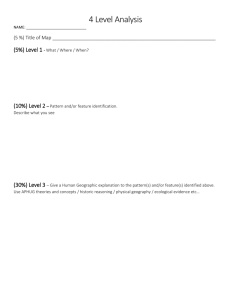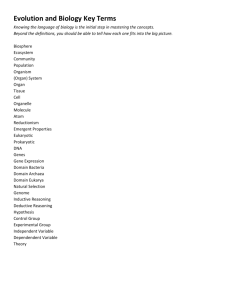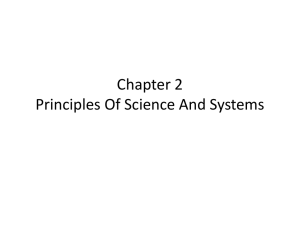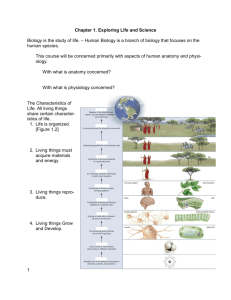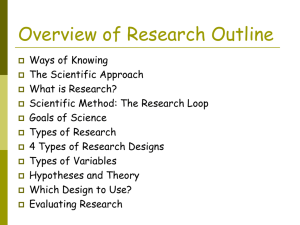Methodological Concepts and Perspectives
advertisement
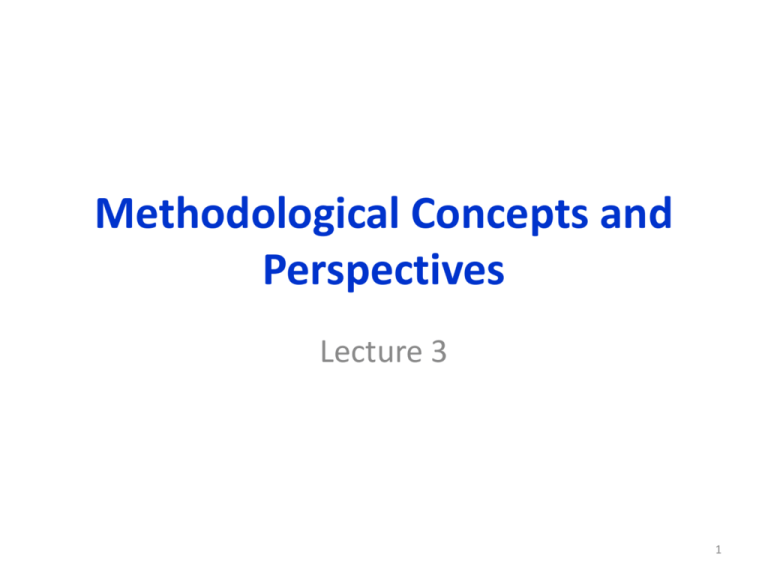
Methodological Concepts and Perspectives Lecture 3 1 Organization of this lecture Concepts & Perspective in Methodology: • Defining science • Considering knowledge • Classification of types of knowledge • Role of personal objectivity • Role of facts, theory and hypothesis 2 Science • Science is the organized accumulation of systematic [reliable] knowledge for the purpose of intelligent explanation/prediction (Williams, 1984) 3 • Science is systematic inquiry -- it is not a static or unchanging entity. • Its intended purpose is explanation / prediction ; science is especially concerned with conditional prediction ie. “if X, Y, and Z occur, W will follow” • Research and Science are mutually interdependent – Science is accumulated, reliable knowledge – Research is a process through which science is expanded and tested for validity 4 • Science does not consist of “factual truth”, devoid of human values or personal views. • Science is inherently a social enterprise and scientific knowledge is shaped by human values, limitations, and social contexts • Personal beliefs can affect scientific judgment and people are fallible. • Scientists should not blindly accept (or reject) ideas, observations or concepts 5 Economics as Art and Science (Is Economics a Science?) • Economics is a science because it accumulates (reliable?) knowledge through systematic inquiry • It is also is an art which applies knowledge to current issues and problems. • Good economic research requires intuition, creativity, and worldly experience 6 Physical vs Social Science • Social science places heavy emphasis on development and use of theories • Physical sciences generate data under controlled conditions to test their theories – postulated relationships between physical forces , verified through experimental design and data generation. • Theories in social science tend to address more complex phenomenon of individual and group motivation and behavior, and effects on societal institutions. (Often can’t be directly observed or quantified under controlled conditions.) 7 Knowledge (How do we “know” what we know?) • Postivistic vs. Normativistic Knowledge (Johnson, 1986) • Private vs. Public Knowledge (Larrabee, 1964) 8 Positivistic vs. Normativistic Knowledge • Positivisitic – knowledge of conditions, or things that are directly observable or measurable • Normativistic – knowledge about values – prescriptive knowledge – what ought or ought not to be done to solve a problem. Inherently embodies judgement – knowledge of values – the goodness and badness of conditions and situations (not observable) 9 Private vs. Public Knowledge (another way to classify knowledge) • Public knowledge can be demonstrated to others through logic and/or evidence. It is reliable knowledge and is shared publically. • Private knowledge is that which we know ourselves but cannot be demonstrated to others. eg. religious beliefs, “faith” • Private knowledge can lead to public knowledge if we set to demonstrate its reliability • Only public knowledge can be reliable in a scientific sense, but what is accepted as public knowledge can be culturally and time dependent 10 Ways We Obtain Knowledge • Six primary means: the senses, experience, intuition, revelation, measurement, and reasoning • All ways of “knowing” can be placed in one of these categories, or some combination. 11 The Senses • Knowledge through sight, sound, touch, taste and smell • These are generally privately perceived and help in forming the basis for each of the other avenues to knowledge, except reasoning 12 Experience • The accumulated total of one’s exposure to and interaction with people, places, things, circumstances, ideas, senses etc.. • Experience knowledge is a disorderly and unorganized means of learning, however, it is an essential component of making sense of knowledge we possess. • We use our experience to evaluate new knowledge in its relation to prior knowledge 13 Intuition • Sensing or feeling of something being accurate or not • Inherently private knowledge • However, this might lead to an orderly exploration and logical development which can lead to public knowledge • Intuition can be important for the creative research process, but cant be accepted as reliable on its own. 14 Revelation • The reception of knowledge from an undefined or unknown source • Not confined to divine revelation; something can just “occur to us”… “out of the blue” • Not a reliable source of knowledge, unless it is tested for reliability 15 Measurement • Knowledge gained through measurement (quantification) such as data. • Its connection to senses and experience is obvious • It is generally considered factual knowledge and reliable, with understanding of sampling or measurement error • Economic research involves a lot of statistical sampling and data gathering 16 Reasoning • The final means of gaining knowledge -- also thought of as “interpretation”. Integrates the other ways • Knowledge gained through reasoning is the only way to derive reliable knowledge of relationships and patterns ,through which we develop explanatory or predictive capability • Reasoning is the main avenue to useful disciplinary, subject-matter, and problemsolving knowledge • Reasoning can be deductive, inductive, or both. 17 Reliability of (Public) Knowledge Two criteria for establishing reliability of knowledge: 1. Supported by evidence (quantitative data or complex logical constructions). This should be measureable 2. The way the evidence is obtained or generated can be demonstrated or reproduced The reliability of things that cannot be directly observed, is through reasoning and logic. 18 Two Types of Logic (Deductive and Inductive) Deductive logic • The process of reasoning from general premises (e.g. assumptions) to specific results or conclusions. Economic theory is largely based on deductive logic. • We establish a series of assumptions about conditions, motivations and behaviors, and logically work through to variables and parameters we wish to explain or predict. 19 Inductive Logic • Is reasoning from the specific circumstances or outcomes to a conclusion about general circumstances or outcomes • It is an empirical process of reaching a conclusion or arriving at new principles from known data and experience by observing objective realities. • The most applicable explanation of induction from economics is statistical inference – Collect data from a sample using established standards and criteria to infer characteristics and behavior of the entire population 20 Logical Fallacies • Errors in reasoning, which can lead to errors in conclusions or unreliable information • List of logical fallacies – – – – – – – – Special pleading (selective use of information) Affirming the consequent (validity of premises??) Attacking the person (person representing issue) Appeal to the people (majority “rules”) Appeal to authority (“X” says its so) False cause (attributing wrong cause to an effect) Argument by analogy (analogous cases act the same) Composition and division (true for part, true for whole, and vice versa) 21 Tests for Reliability Besides avoiding logical fallacies, more comprehensive guidelines are needed Four tests are recognized: • logical coherence, • correspondence • clarity (comprehensiveness) • the pragmatic test of workability 22 Test of Logical Coherence • Examining an outcome or proposition to see if it is free of logical contradiction (errors and fallacies) • Meeting the test of logical coherence does not ensure the reliability of the outcome but its reliability fails if the test is not met • When applied to theory, it is a test of whether the conclusions follow logically from the assumptions. 23 Test of Correspondence • Comparing an outcome or statement to what is already ‘known’ to see if it is consistent with prior knowledge. • When applied to theory, it examines whether conclusions are supported by empirical evidence. 24 Test of Clarity • Examines the outcome or proposition for lack of ambiguity or vagueness. • If more than one meaning, it fails the test • Use of a concept in which terms used are not well defined so the meanings are vague 25 Test of Workability (Pragmatism) • The results have to solve the problem or issue addressed. • The results must work, be relevant, and be reliable EXAMPLE: PHYSICIAN GIVING A CHILD A SMALLPOX VACCINATION. • Correspondence – yes – it has worked before, but for child no (lack prior knowledge) • Coherence – yes for doctor but not for child • Clarity – yes for doctor and not for child • Workability – did it work for the child? • If these tests are met, the knowledge can be considered tentatively reliable, subject to further tests. • We must consider all of the relevant evidence when evaluating reliability of knowledge 26 Role of Personal Objectivity • Fundamental to reliable knowledge • Avoid trying to impose our private values and beliefs on others • Subjectivity is associated with beliefs, values and opinion. Reliable public knowledge cannot be derived from personal subjective positions. • Objectivity relies on what is demonstrable by observation, measurement, and logic. 27 • Objectivity is the cornerstone of science and reliable knowledge. • However, no scientist is completely objective. All introduce some subjectivity in our work, even by deciding what issues to study. • Strive for scientific neutrality, by avoiding personal values influencing research. Be open to any research outcome. 28 Scientific Prediction • Scientific prediction involves theory used in conjunction with empirical (experimental) knowledge and experience. • It involves the interaction of the following terms: Fact – a verifiable observation Theory – logical relationships among facts Hypothesis – a testable proposition 29 Facts • Observations that we establish through sense or measurement • Facts are positive (directly observable or measureable) and independent of personal judgment • Facts are not necessarily “permanent” • They are not by themselves used for prediction • Facts and values need to be differentiated, but there can be facts about values 30 Theory • Theories establish relationships, using deductive logic and facts as building blocks • A theory is not unfounded speculation, as in the popular phrase “that may be true in theory, but …” This is wrong! • Theories are used for predictive and explanatory purposes • Theories are tested by their internal logic • Theories are abstractions, simplifications, and/or generalizations 31 Functions of Theory in Economic Research • Orientation – framework to establish a problem or queston • Classification – defined meanings that facilitate understanding of complex concepts • Conceptualization – visualizing how something works or suggesting causes and effects • Summarization – Empirical generalization – Generalized relationships 32 Functions of Theory … cont. • Provision of precision – help to relate facts and concepts • Prediction of facts or identification of hypotheses • Identification of gaps in our knowledge 33 Hypothesis • A result or outcome that is not yet evaluated or tested • It is a tentative assertion of a relationship between factors or events that is subject to verification eg. Statistical hypothesis testing in econometrics: 1) significance of individual parameters 2) statistical fit of the entire model 34 Hypothesis … cont. Three categories of hypotheses: 1. Maintained hypotheses – things assumed true for the purposes of a study 2. Diagnostic hypotheses – propositions about the cause of a problem 3. Remedial hypotheses – proposed solutions to problems 35

